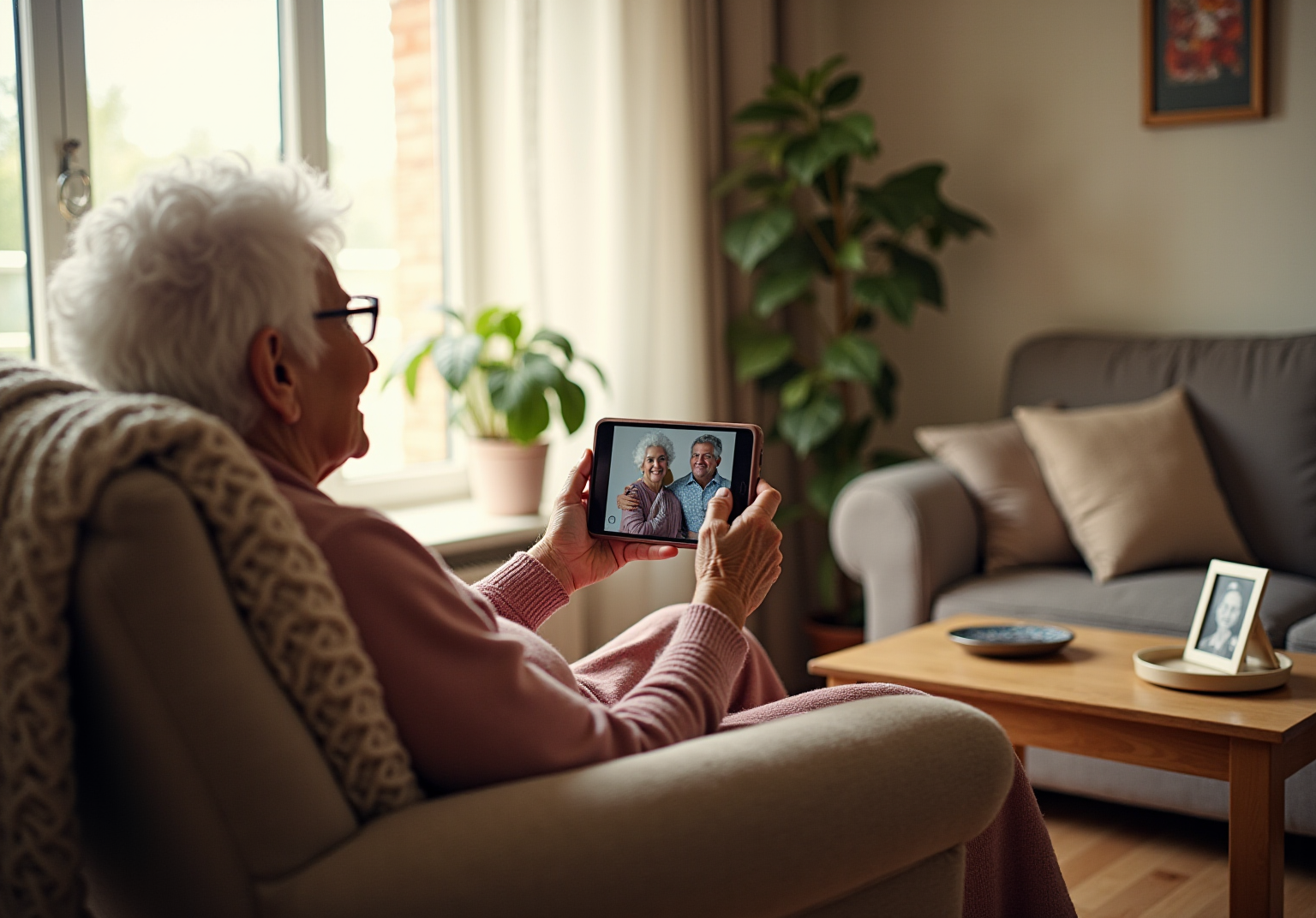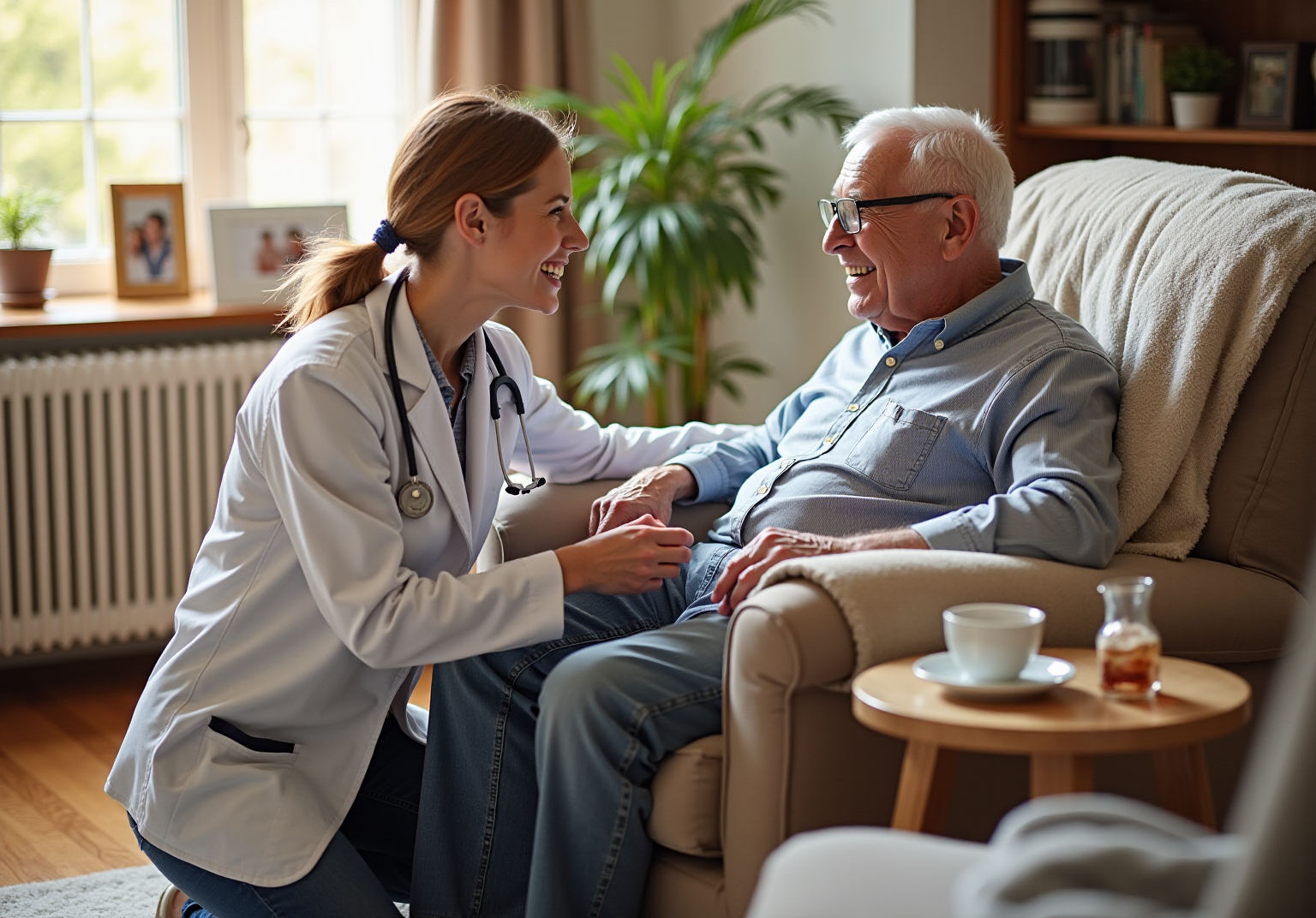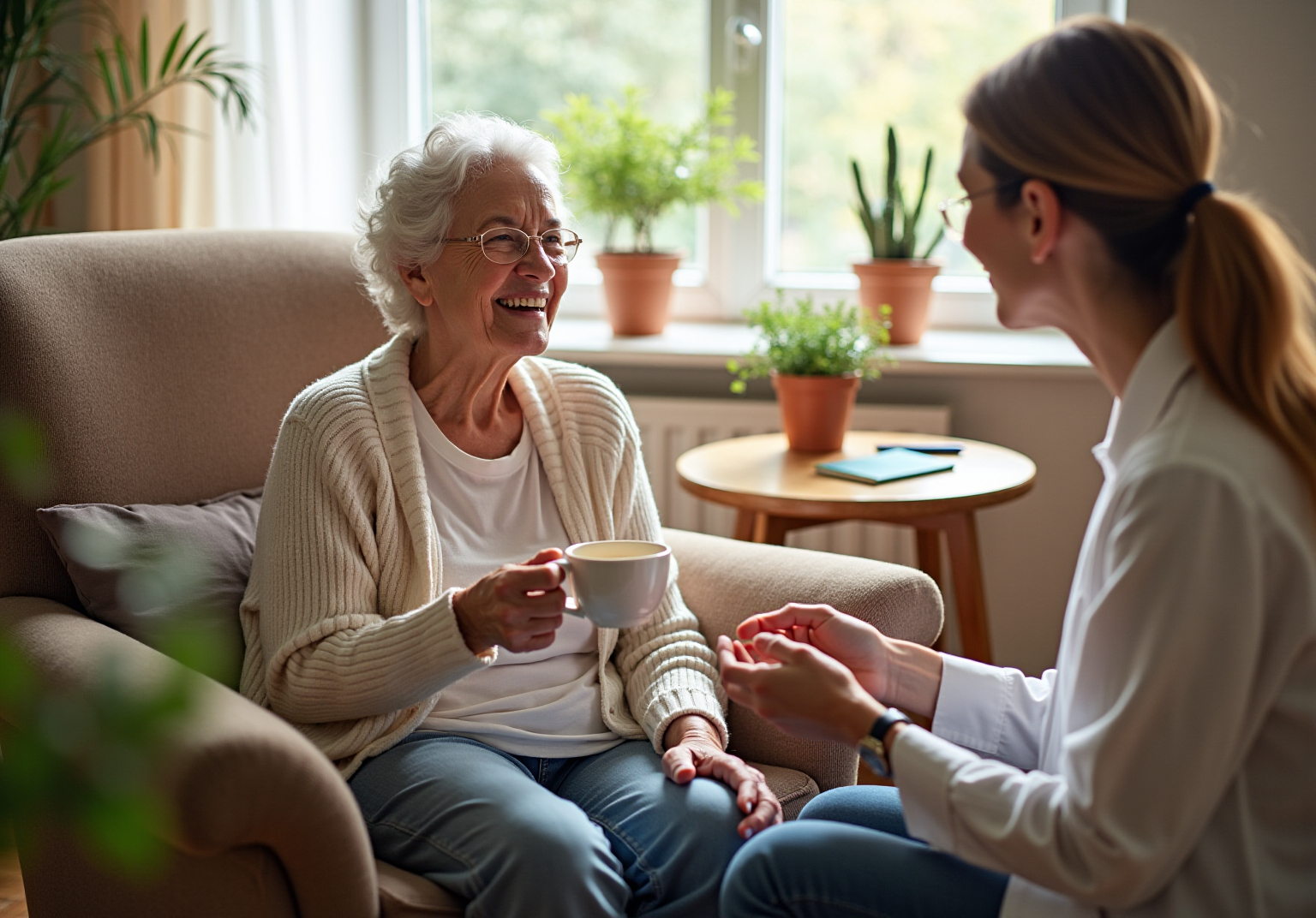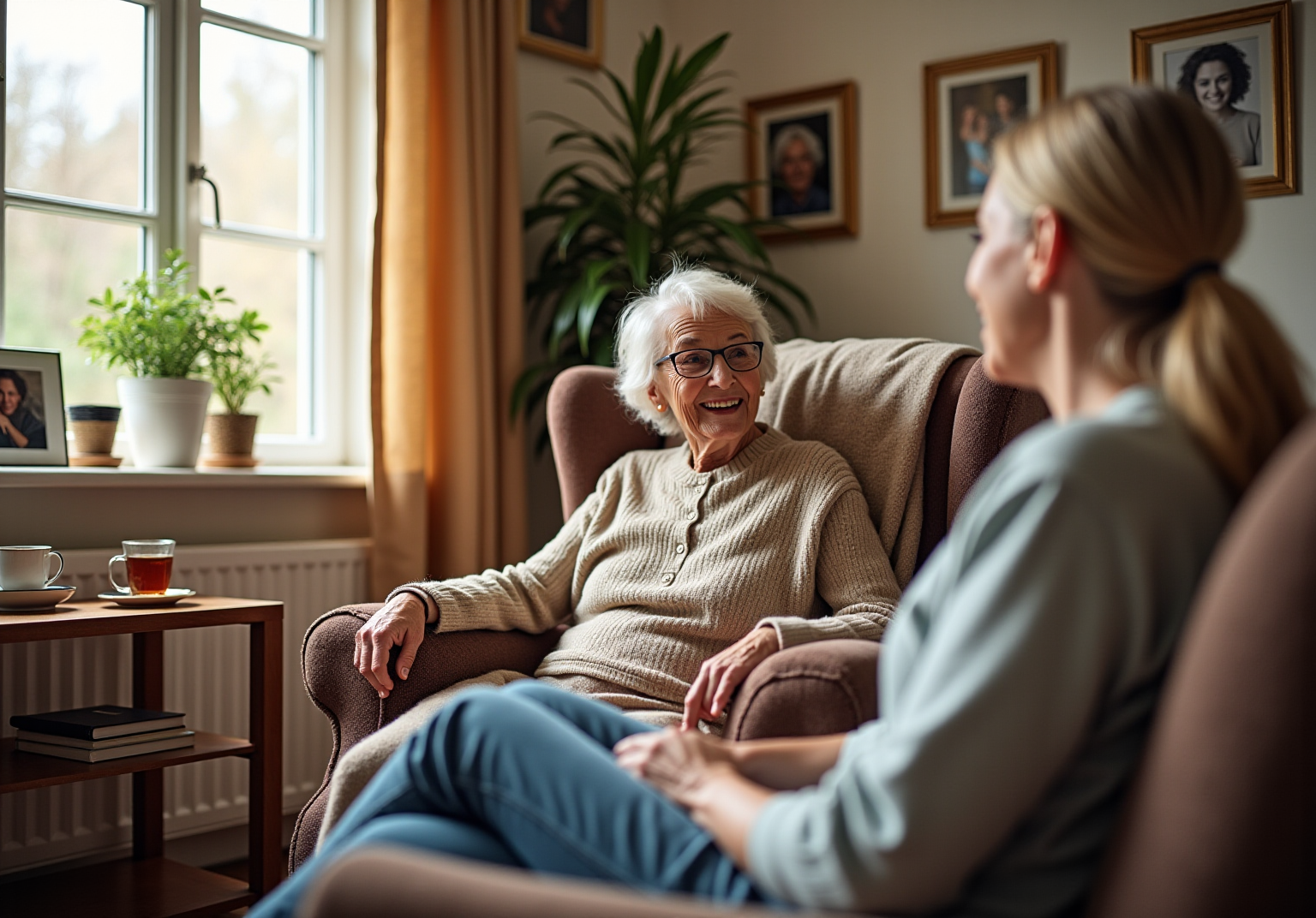Overview
Caring for older adults is a journey that requires compassion and understanding. This article highlights four essential practices that can make a significant difference in their lives:
- Conducting regular check-ins
- Assisting with daily tasks
- Ensuring home safety
- Encouraging social engagement
Each of these practices is rooted in research and expert recommendations, emphasizing the importance of maintaining emotional connections and promoting independence.
Imagine the peace of mind that comes from knowing your loved one is safe and engaged. By regularly checking in, you can help prevent accidents and combat feelings of isolation. Assisting with daily tasks not only fosters independence but also strengthens the emotional bond between caregiver and senior. Ensuring home safety is crucial; a secure environment allows for greater freedom and comfort.
Furthermore, encouraging social engagement enriches their lives, helping to enhance overall well-being and quality of life. Remember, we’re here for you, and your loved one deserves the best care possible. Together, we can create a nurturing environment that prioritizes their happiness and health. Let’s take these steps to ensure they feel valued and connected.
Introduction
As our loved ones age, the importance of supporting seniors in their daily lives becomes increasingly paramount. Caregivers play a vital role in enhancing the well-being of older adults, not just through assistance with daily tasks, but also by fostering social connections and ensuring a safe living environment.
Have you ever considered how a simple check-in can combat feelings of isolation? Or how implementing safety measures can prevent accidents? These strategies for improving seniors’ quality of life are multifaceted and essential.
This article delves into the various approaches caregivers can take to empower seniors, enhance their independence, and promote mental health. Together, we can lead our seniors towards a more fulfilling and enriched life in their golden years.
Conduct Regular Check-Ins to Foster Connection
Conducting regular check-ins can take various forms, such as phone calls, video chats, or in-person visits. These interactions should encompass not only wellness evaluations but also informal discussions that allow older adults to express their emotions and concerns. For instance, providers might arrange weekly calls to talk about any changes in wellness or daily routines, ensuring that seniors feel valued and connected. The integration of technology, such as wellness check-in apps, can further streamline these interactions, enabling caregivers to stay informed about their clients’ needs.
Studies highlight the significance of consistent interpersonal interactions in reducing feelings of isolation and enhancing mental well-being for older adults. A study found that 27.9% of individuals aged 75 or older experience disabilities, underscoring the necessity for ongoing engagement to support their well-being. Routine check-ins can help mitigate risks associated with isolation, such as cognitive decline and medication mismanagement, which are crucial for preserving the well-being of older adults.
Furthermore, participating in community activities can strengthen connections beyond the family, which is vital for enhancing mental health and alleviating isolation. Experts emphasize that understanding seniors’ interactions is essential for improving their quality of life. By prioritizing these connections, caregivers can significantly contribute to the overall well-being of older adults, ensuring they remain connected and supported in their daily lives. Additionally, government support and community initiatives are vital in helping the elderly maintain their social capabilities post-retirement.
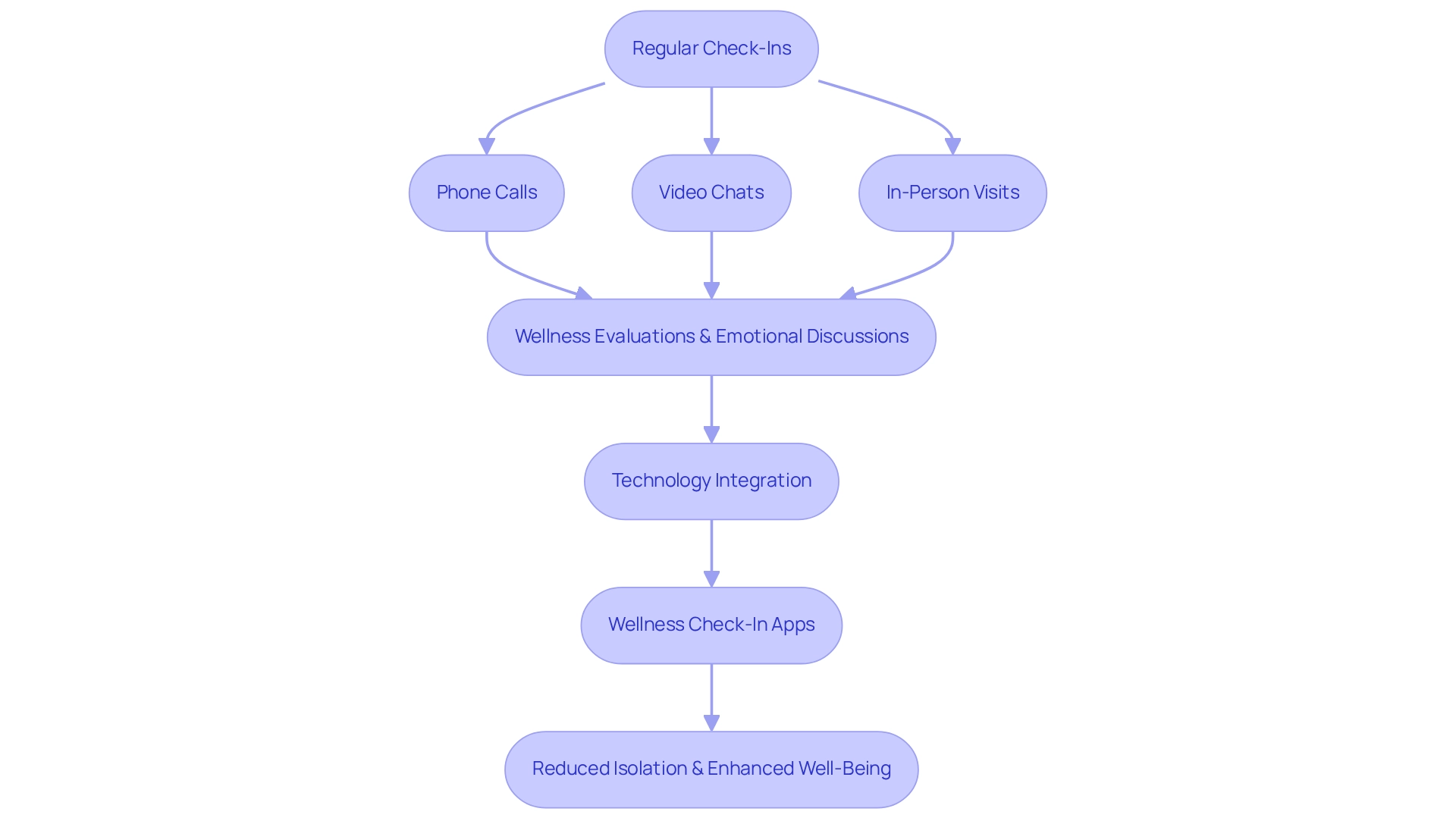
Assist with Daily Tasks to Enhance Independence
Caregivers play a vital role in helping old people with activities of daily living (ADLs), such as bathing, dressing, grooming, and meal preparation. By encouraging older adults to participate in these tasks, we nurture their sense of control and independence. For instance, creating a daily routine that includes time for cooking or light cleaning can empower older adults, offering them a rewarding sense of achievement.
The introduction of adaptive tools is essential for enhancing independence while ensuring safety. Tools like grab bars in bathrooms and user-friendly kitchen gadgets can significantly assist elderly individuals in performing daily tasks. Have you noticed how older adults who actively engage in their routines often experience greater satisfaction and enhanced mental well-being? A study on the challenges faced by older adults in performing ADLs identified grooming and bathing as particularly difficult tasks, underscoring the need for targeted care strategies that prioritize these areas.
Furthermore, professional guidance from occupational therapists highlights the significance of adaptive tools in enhancing the independence of older adults. These tools not only assist with daily living activities but also promote overall well-being, enabling older adults to preserve their dignity and quality of life. By concentrating on these methods, we can effectively assist in helping old people with their daily activities, enhancing their autonomy and overall contentment. Remember, your comfort is our priority, and we’re here for you.
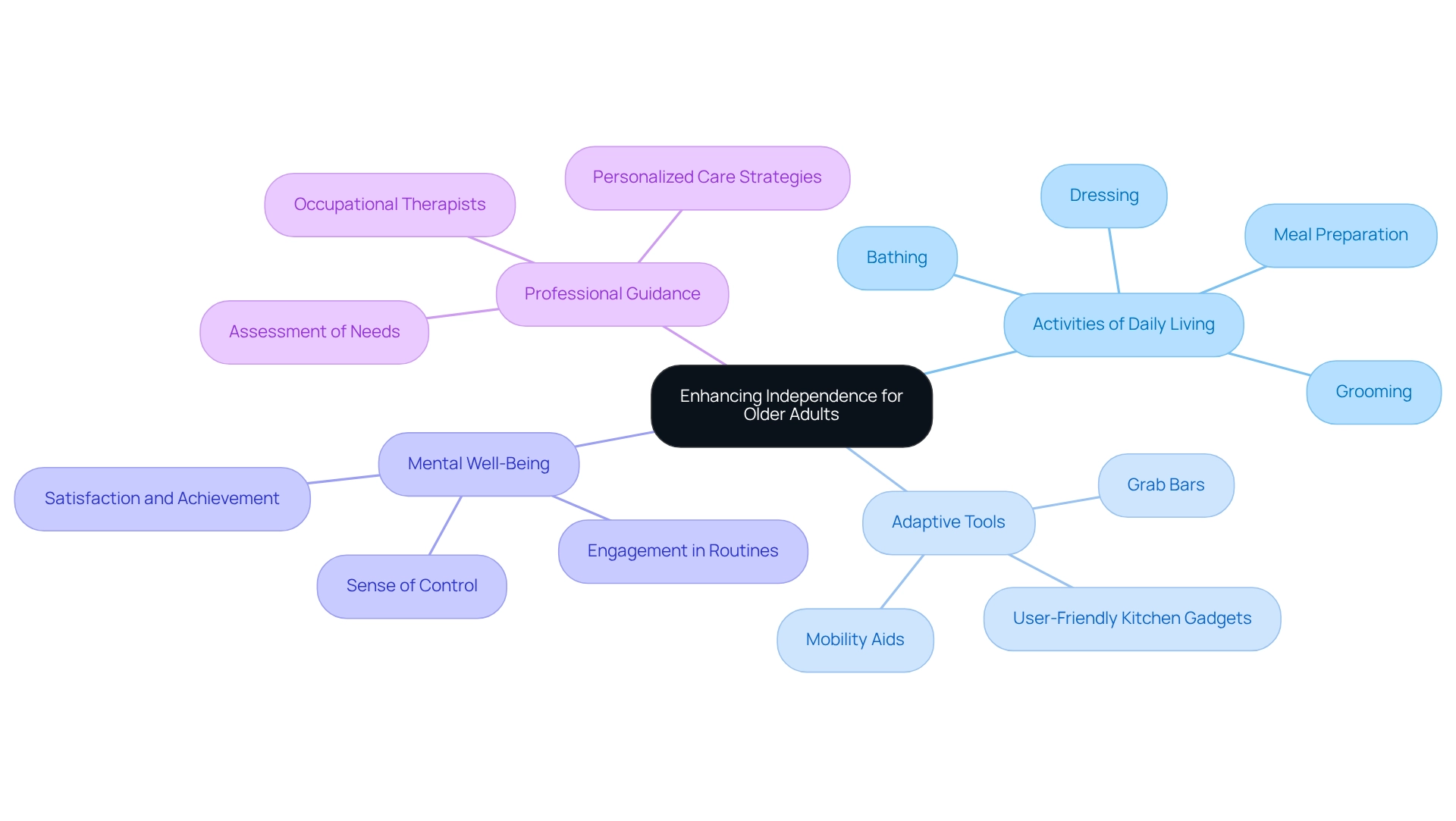
Ensure Home Safety to Prevent Accidents
To enhance home safety for older adults, caregivers are encouraged to conduct thorough evaluations of the living environment. Identifying potential dangers—such as loose rugs, insufficient lighting, and cluttered pathways—is essential. By implementing effective safety modifications, like installing grab bars in bathrooms, ensuring adequate lighting, and eliminating tripping hazards, the risk of falls can be significantly reduced. Additionally, educating seniors on safety practices, such as using non-slip mats and wearing appropriate footwear, is crucial for their well-being.
Regular safety checks should be scheduled to maintain a secure living space. Did you know that by 2023, Medicare and Medicaid will cover nearly half of the costs associated with falls, totaling $21 billion? This statistic underscores the financial and health implications of fall-related incidents. Furthermore, the alarming rise in fall-related deaths among adults aged 65 and older highlights the urgent need for proactive measures. Experts note that staying at home with limited activities and hoping a fall does not occur is a ‘prevention’ strategy that contradicts evidence-based recommendations.
Simple adjustments can lead to a significant reduction in home accidents. It is vital for caregivers to prioritize safety evaluations and interventions. By addressing these factors, caregivers can create a safer environment that encourages independence and well-being for seniors, ultimately helping old people. At Best Care Nurses Registry, we emphasize the importance of personalized care solutions, ensuring that your loved one is safe and happy at home.
Moreover, caregivers should consider the significance of selecting the appropriate medical alert system to further enhance safety measures. This not only offers peace of mind for families but also nurtures a supportive environment. If you’re uncertain whether your elderly relative requires home care, look for signs such as difficulty with daily activities or increasing health concerns. Best Care Nurses Registry is here to help assess the need for assistance in helping old people and to offer referrals to reliable individuals who can implement these important safety measures.
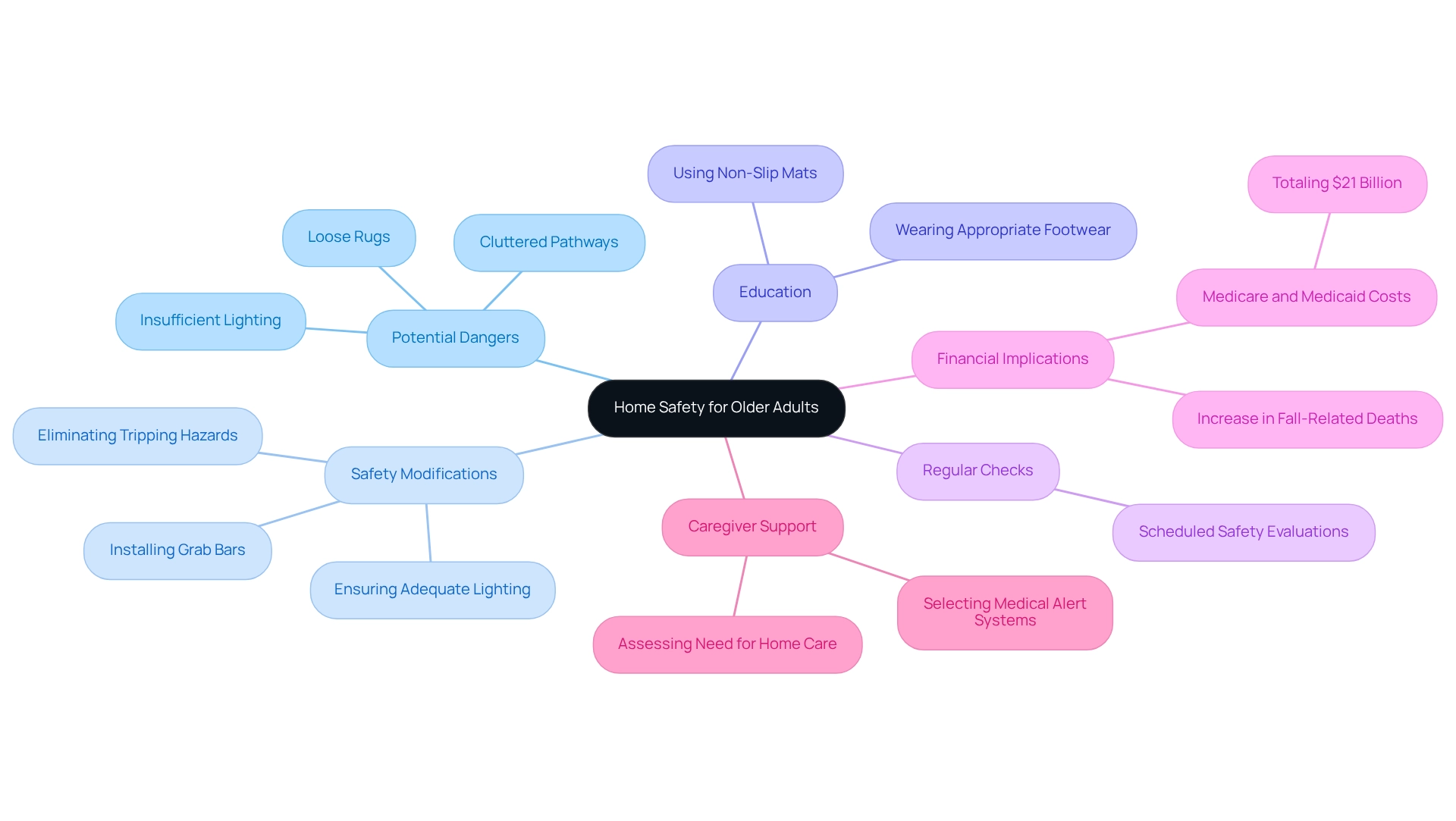
Encourage Social Engagement to Combat Isolation
Caregivers, including Certified Nursing Assistants (CNAs) and Home Health Aides (HHAs), play a vital role in helping old people engage in social activities. Whether through community events, clubs, or family gatherings, these caregivers are there to support our loved ones. They assist with daily living tasks, such as bathing, dressing, and meal preparation, while also keeping family members informed about the patient’s condition. With CNAs and HHAs available for hourly services, elderly individuals can receive the necessary support without any minimum requirement.
Arranging regular outings, like trips to nearby parks or involvement in hobby groups, can provide older adults with opportunities to connect with others. Furthermore, technology can enhance interpersonal engagement; for instance, arranging video calls with family members or friends can help preserve those important relationships. Research shows that seniors who participate in community activities experience lower rates of depression and improved cognitive function. In fact, the average number and frequency of community activities among older adults is only 0.71 and 1.31, respectively. This highlights the need for caregivers to facilitate more activities that promote social interaction.
Caregivers can also organize group activities, such as game nights or exercise classes, to encourage interaction and community involvement. Findings from a case study on the challenges faced by the elderly demographic in China emphasize the importance of addressing mental wellness through effective community engagement strategies. By prioritizing social connections, caregivers can play a vital role in helping old people lead more fulfilling lives, ultimately enhancing their quality of life and mental health. We’re here for you, and together, we can make a difference in the lives of our cherished seniors.
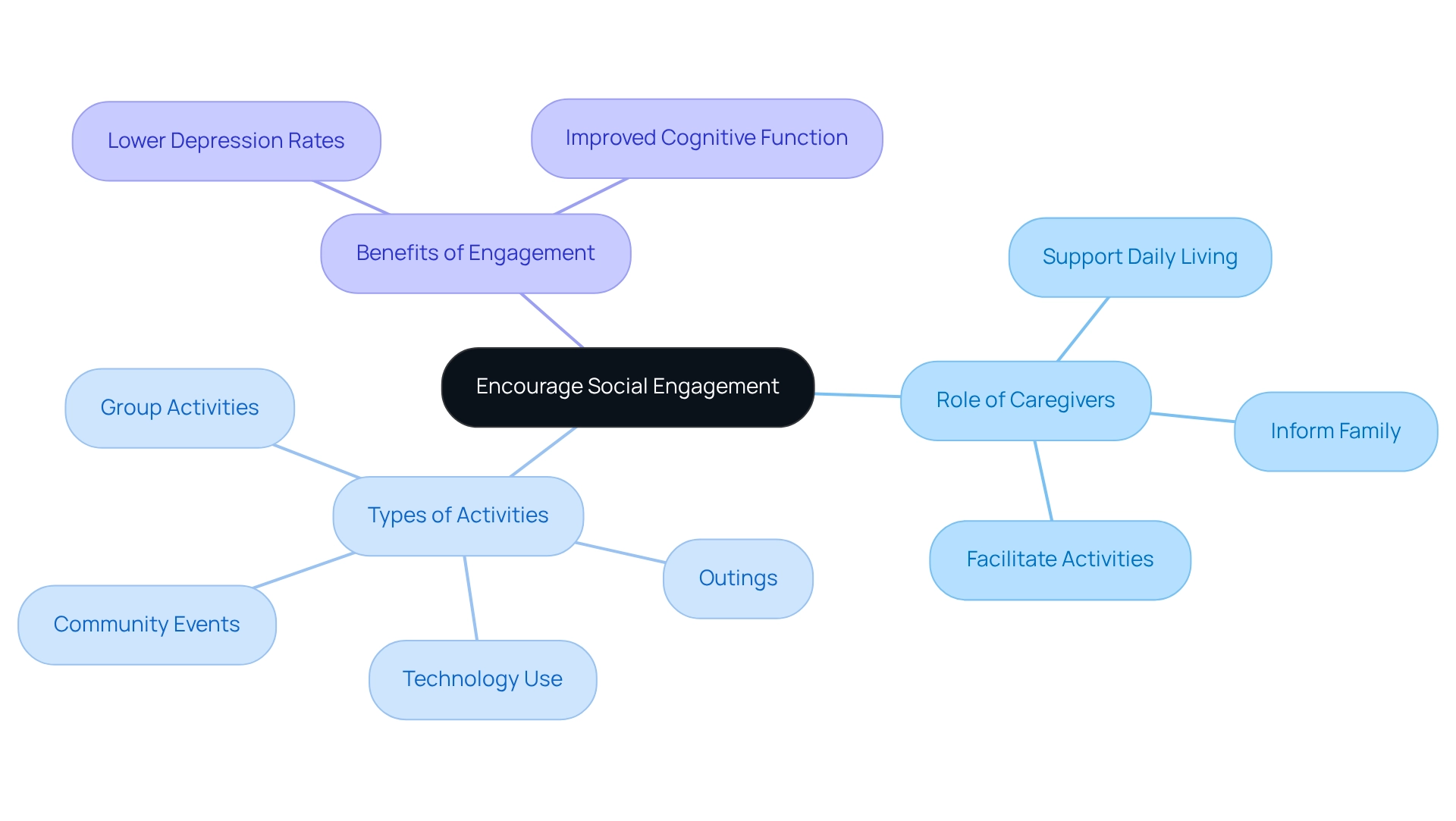
Conclusion
Supporting seniors in their daily lives is not just important; it’s essential for enhancing their well-being and independence. Regular check-ins foster meaningful connections that reduce isolation and promote mental health, ensuring seniors feel valued and cared for.
Assisting with daily tasks empowers seniors, instilling in them a sense of accomplishment. By utilizing adaptive tools, older adults can engage in their routines, significantly improving their quality of life and dignity.
Home safety is crucial in preventing accidents, which can have severe consequences. Conducting comprehensive safety assessments and making proactive modifications create secure living environments, promoting autonomy and peace of mind for both seniors and their families.
Encouraging social engagement is key to combating isolation. Facilitating participation in community activities and using technology to maintain family connections can significantly enhance mental health outcomes for older adults.
In conclusion, caregivers play a pivotal role in improving the lives of seniors through these compassionate strategies. By focusing on connection, independence, safety, and social engagement, caregivers empower older adults, fostering a supportive environment that values their well-being and ensures their golden years are filled with joy and dignity. Remember, we’re here for you, and your comfort is our priority.
Frequently Asked Questions
What are regular check-ins and why are they important for older adults?
Regular check-ins can include phone calls, video chats, or in-person visits that focus on wellness evaluations and informal discussions. They are important because they help reduce feelings of isolation, enhance mental well-being, and ensure older adults feel valued and connected.
How often should check-ins occur and what should they cover?
Check-ins should be conducted regularly, such as weekly, and should cover wellness updates and any changes in daily routines, allowing seniors to express their emotions and concerns.
What role does technology play in facilitating check-ins?
Technology, such as wellness check-in apps, can streamline interactions between caregivers and older adults, helping caregivers stay informed about their clients’ needs.
What are the risks associated with isolation in older adults?
Isolation can lead to cognitive decline and medication mismanagement, both of which are crucial issues that can affect the overall well-being of older adults.
How can community activities benefit older adults?
Participating in community activities can strengthen social connections beyond family, which is vital for enhancing mental health and alleviating feelings of isolation.
What is the role of caregivers in supporting older adults’ well-being?
Caregivers play a significant role by prioritizing interpersonal connections and facilitating regular check-ins, which contribute to the overall well-being and quality of life for older adults.
How can government support and community initiatives assist older adults?
Government support and community initiatives are essential in helping the elderly maintain their social capabilities after retirement, promoting ongoing engagement and connection.

